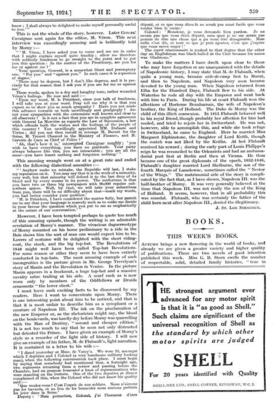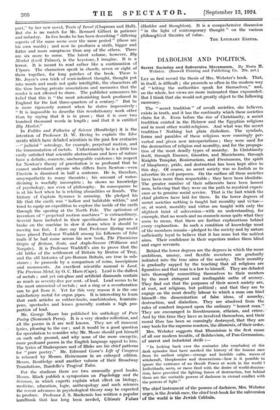BOOKS.
THIS WEEK'S BOOKS.
AUTUMN brings a new flowering in the world of books, and already we are given a greater variety and higher quality of publications. There are two novels of good intention published this week. Miss G. B. Stern swells the number of respectable, solid, detailed family histories, " true in part," by her new novel,-Tents of Bract (Chapman and Hall). But she is no match for Mr. Bernard Gilbert in patience and industry. In five books he has been describing " differing aspects of the same scene over the same period " (those are his own words) ; 'and now he produces a sixth, bigger and fatter and more sumptuous than any of the others. There are six more to come. The latest volume, however, Bly Market (Cecil. Palmer), is the keystone, I imagine. It is a terror. It is meant to read rather like a continuation of Ulysses. The characters speak in chords, seven or eight of them together, for long patches of the book. There is Mr. Joyce's own trick of semi-indirect thought, thought put into words and made not quite intelligible, the characters all the time having private associations and memories that the reader is not allowed to share. The publisher announces his belief that this is " the most astonishing book produced in England for the last three-quarters of a century." But he is more rigorously correct when he states impressively : " It is impossible to describe this revolutionary work other than by saying that it is in prose ; that it is over two hundred thousand words in length ; and that it is entitled Bly Market."
In Foibles and Fallacies of Science (Routledge) it is the intention of Professor D. W. Hering to explain the false scents which have deluded scientists in the past few centuries —" judicial " astrology, for example, perpetual motion, and the transmutation of metals. Unfortunately he is a little too easily satisfied that scientific abstractions and laws of nature have a definite, concrete, unchangeable existence : his respect for Newton's theory of gravitation is so profound that he cannot understand anyone who differs from Newton—even Einstein is dismissed in half a sentence. He is, therefore, unsympathetic to many theorists ; his account of water- divining is woefully incomplete ; he shows no knowledge of psychology, nor even of philosophy. In consequence he is at his best when he is relating absurdities or frauds. The history of Captain Syrnmes is amusing. He pledged his life that the earth was " hollow and habitable within," and tried to equip an expedition to explore the inside of the earth through the opening at ,the North Pole. The optimism of inventors of " perpetual motion machines is extraordinary. Several have included in their specifications for patents a brake on the machine to slow it down when it should be moving too fast. I dare. say. that Professor Hering would have placed Professor Waddell among his followers of false trails if he had come across his new book, ThE Phoenician Origin of Britons, .Scots, and Anglo-Saxons (Williams and. Norgate). It is Professor Waddell's aim to prove that the old fables of the settlement of Britain by Brutus of Troy, and the old histories of pre-Roman Britain, are true in sub- stance ; he proceeds by a comparison of coins, inscriptions and monuments. An excellent scientific manual is Lead, The Precious Metal, by 0. C. Harn (Cape). Lead is the dullest of metals ; and yet cut-glass and artificial diamonds contain as much as seventy-five per cent. of lead. Lead seems to be the most unmusical of metals ; not a ring or a reverberation can be got from it. Yet for this very reason it is the one satisfactory metal for organ pipes. It is interesting to learn that such articles as rubber-boots, mackintoshes, fountain- pens, spectacles and lenses generally contain a high pro- portion of lead.
Mr. George Moore has published his anthology of Pure Poetry (Nonesuch Press). It is a very slender collection, and all the poems in it are well known. They are all innocent lyrics, pleasing to the ear ; and it would be a good question for speculation to consider why Mr. Moore should put himself on such safe ground, and why none of the more energetic, more profound poems in the English language appeal to him. The lyrics of Shakespeare and of Blake are his chief patterns for " pure poetry." Mr. Edmund Gosse's Life of Congreve is reissued by Messrs. Heinemann in an enlarged edition. Messrs. Routledge send another volume of their Broadway Translations, Bandello's Tragical Tales.
For the studious there are two unusually good books. Messrs. Black publish a symposium on Psychology and the Sciences, in which experts explain what effect on biology, medicine, education, logic, anthropology and such sciences the recent advances in psychological theory may be expected to produce. Professor J. S. Mackenzie has written a popular handbook that has long been needed, Ultimate Values
(Hodder and Stoughton). It is a comprehensive discussion " in the light of contemporary thought " on the various philosophical theories of value.
THE LITERARY EDITOR.



































 Previous page
Previous page